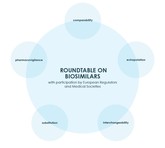Biosimilars/Research
Comparability of biosimilar Ontruzant maintained over three years
Samsung Bioepis has presented positive long-term results for its trastuzumab biosimilar Ontruzant (SB3) at the 16th International Maternal Cancer Congress St Gallen 2019, which was held in Vienna, Austria.
Clinical development of a bevacizumab biosimilar
Authors, Kambiz Novin and Nafiseh Mortazavi, from medical faculties of Iranian Universities, discuss the methodological considerations for the clinical development of a bevacizumab biosimilar [1].
Economic considerations for biosimilars in the US
Smeeding and colleagues explore cost considerations related to biosimilars in the US, and present a broad perspective on value beyond price reduction in a recent review.
Biosimilar drug packaging does not meet EU guidelines on readability
Analysis of 35 biosimilar medicines licensed by the European Medicines Agency (EMA) finds packaging to be more complex than recommended. None of the packaging leaflets analysed were found to be ‘easy to understand’, with sections on therapeutic indication and side effects found to be the most complex [1].
Efficacy and safety of bevacizumab biosimilar ABP 215
Authors from the US and Europe report data from a phase III study comparing the clinical efficacy and safety of the bevacizumab biosimilar ABP 215 (Mvasi) with originator bevacizumab Avastin in patients with advanced non-squamous non-small cell lung cancer (NSCLC) [1].
Key considerations for biosimilars in the US
Key considerations regarding biosimilars for payers in the US are discussed in a recent review [1]. The authors explore factors promoting the uptake of biosimilars, interchangeability and naming considerations, and challenges to uptake.
Impact of proposed changes to FDA approach to biosimilars
In the Opinion article, Professor Sarfarez Niazi urges the US Food and Drug Administration (FDA) to make adjustments to its guidance on biosimilar development [1]. Niazi’s proposals are consistent with the anti-regulatory political rhetoric and administrative actions that are becoming increasingly widespread in the US. In this article, Professor Pekka Kurki comments on some of Niazi’s proposals from a global perspective [2].
ESMO survey highlights need for education and alignment
The results of a survey carried out by the European Society for Medical Oncology (ESMO) on biosimilars understanding in oncologists have highlighted the need for education and worldwide alignment [1].
Phase III clinical trials started for adalimumab biosimilars
Phase III clinical trials have been started for adalimumab biosimilars from Alvotech and Celltrion.
How can EU policymakers access the potential of biosimilars
Policymakers in Europe should introduce a long-term, multi-stakeholder framework to realize the full potential of off-patent biologicals and biosimilar drugs, according to the results of a series of roundtable discussions held with clinicians, government bodies and industry representatives [1].













